Kaist
Korean

Announcements
College of Engineering Notice
-

A Self-Made Couple in Their 90s Donates to KAIST
< Chairman Chang, 92, and his wife Ha-Ok Ahn, 90, gave away their two properties valued at 20 billion to KAIST. > A self-made elderly couple in their 90s made a 20 billion KRW donation to KAIST on March 13. Chairman of Samsung Brush Sung-Hwan Chang and his wife Ha-Ok Ahn gave away their two properties valued at 20 billion in Nonhyon-dong in Seoul to KAIST during a ceremony on March 13 in Seoul. Chairman Chang, 92, made a huge fortune starting his business manufacturing cosmetic brushes. Building two factories in China, he expanded his business to export to high-end cosmetic companies. Chairman Chang, a native of North Korea, is a refugee who fled his hometown with his sister at age 18 during the Korean War. He said remembering his mother who was left behind in North Korea was the most painful thing. “We always wanted to help out people in need when we would earn enough money. We were inspired by our friends at our retirement community who made a donation to KAIST several years ago. We believe this is the right time to make this decision,” said Chairman Chang. The couple lives in same retirement community, a famous place for many successful businessmen and wealthy retired figures, located in Yongin, Kyonggi-do with Chairmen Beang-Ho Kim, Chun-Shik Cho, and Chang-Keun Son. With their gift, KAIST established Kim Beang-Ho & Kim Sam-Youl ITC Building as well as the Cho Chun-Shik Graduate School of Green Transportation. The four senior couples’ donations amount to 76.1 billion KRW. “It would be the most meaningful way if we could invest in KAIST for the country’s future,” said Chairman Chang. “I talked a lot with Chairman Kim on how KAIST utilizes its donations and have developed a strong belief in the future of KAIST.” Chairman and Mrs. Chang already toured the campus several times at the invitation of President Kwang-Hyung Lee and President Lee himself presented the vision of KAIST to the couple. The couple also attended President Lee’s inauguration ceremony on March 8. President Lee thanked the couple for their donation, saying “I take my hat off to Chairman Chang and his wife for their generous donation that was amassed over their lifetime. They lived very fiscally responsible lives. We will efficiently utilize this fund for educating future global talents." (END)
-
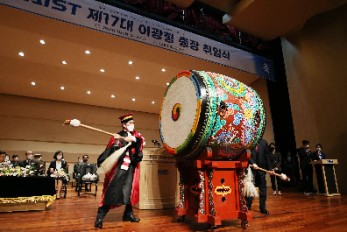
Upbeat Message for a New Future at President Lee’s Inaugurat..
< President Lee delivers his inaugural address during the inauguration ceremony on March 8. > KAIST’s 17th President Kwang Hyung Lee reaffirmed his commitment to building a new future preparing for the post-AI era during his inauguration on March 8. The Board of Trustees selected the former provost and executive vice president as the new president, succeeding 16th President Sung-Chul Shin whose four-year term expired last month. In his inaugural address, President Lee proposed a new culture strategy, ‘QAIST’ designed to foster more creative talents and ensure innovative research infrastructure. He said that the best way to stand out as a leading global university is to carve out our own distinctness. The ceremony was live streamed via YouTube due to the social distancing guidelines, with a very limited number of distinguished guests attending. Among them were President Lee’s former student Jung-Ju Kim who started Nexon, now the world’s most popular online game company, and former Chairman of the Board of Trustees Moon-Soul Chung who President Lee worked with when he made the endowment for establishing the Department of Bio and Brain Engineering in 2001 and the Moon Soul Graduate School of Future Strategy in 2013. In his induction speech, Chairman Woo Sik Kim of the Board of Trustees said that President Lee is a proven leader who has deep insight and passion and he will help KAIST make a new leap forward. “I believe that Professor Lee will be the right leader at this critical moment for the university, ushering in a new future for KAIST as it turns 50 this year.” President Lee explained that for the next 50 years, KAIST should double down to identify the challenges humanity faces, then define and resolve them with unyielding innovations in education, research, technology commercialization, and internationalization. < The 16th President Sung-Chul Shin (left) hands over the KAIST flag to his successor President Lee. > “We definitely should pull together to produce sustainable global value that will serve the prosperity and happiness of all humanity, not only our nation. We will become one of the top 10 universities in the world when we realize all these goals. We can live up to the people’s expectations by producing creative global talent, staying ahead of new research topics, and producing corporations that will lead the nation’s industries.” “To this end, I will continue to strive to help us achieve our mission of becoming a ‘Global Value Creative Leading University’ as described in KAIST Vision 2031. I will do my utmost to bring about the ‘KAIST New Culture Strategy, QAIST’ for a post-AI era.” He added that he would like to inspire students and faculty to have more humanistic approaches in their education and learning. The ‘Q’ in “QAIST” refers to questioning. President Lee believes that the learning starts with questions and being curious about something. “We will innovate the educational system to have them question everything.” Then, he said that he will focus on ‘A’dvanced research to prepare for the post AI-era. “We should be the first mover who can define and solve new problems. It’s more important to be the ‘first’ one than the ‘best’ one.” He also said he will create a new culture that failing would not be stigmatized, offering more chances after failing. ‘I’nternationalization is another vision the new president will continue to pursue. He plans to embrace greater diversity on the campus to achieve goals of 15% international faculty, 25% female faculty, and 15% international students by reshaping the recruiting policy. He will continue to expand KAIST campuses overseas. ‘S’tartup and technology commercialization will be the crucial areas where the president will make innovations. “I will fully support any startups at KAIST. I encourage every lab to start a startup,” he stressed. President Lee said he plans to increase KAIST’s annual revenue from technology commercialization fees to 100 billion KRW in 10 years, a step to secure financial independence. He plans to privatize the Institute of Technology Value Creation, which is responsible for technology commercialization at KAIST to enhance its competitiveness. ‘T’rust building is the prerequisite value for creating transparent and reliable management in finance and HR. President Lee said he would like to make a new organizational culture that will be more ethical, responsible, and autonomous with a high standard of integrity. His predecessor, President Sung-Chul Shin lauded his successor in his congratulatory speech saying, “He is a president prepared for this job.” “I have known him for more than 30 years. He is a man of action. With unparalleled ideas and prompt execution, he carried out all his duties efficiently for the Committee of Vision 2031 that he chaired, and played a central role in establishing the full vision of KAIST. First and foremost, he is a man of great passion, with a firm vision but a warm heart.” < Nexon founder Jung-Ju Kim, former student of President Lee, makes an emotional tribute to his professor during the ceremony. > Nexon founder and Chairman Jung-Ju Kim also made an emotional tribute to his former professor. Holding back tears, he said, “I was not a good student. I was struggling in my graduate courses so I had to drop out of my PhD course. But Professor Lee and his wife never gave up on me. They were so kind to me and were always encouraging despite my disappointing days. I am now ready to do something good for KAIST, for Professor Lee, and for the future of our society. I believe that President Lee will guide us down the new path for KAIST.” IDIS Holdings CEO Young-Dal Kim also attended the ceremony to congratulate his former professor on his inauguration. (END)
-
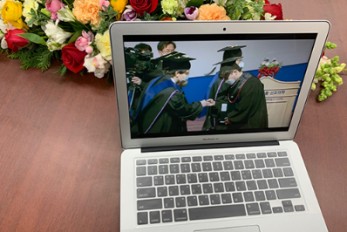
KAIST Celebrates 50-Year Anniversary with 2,712 New Graduate..
< YouTube Livestreaming of 2021 Commencement Ceremony > KAIST is proud to announce the graduation of 2,712 students, including 668 PhDs and 1,331 master’s degree recipients. The pandemic could not stop the university from recognizing each graduate's remarkable and original achievements. A pandemic-proof blended commencement ceremony was held on Friday, February 19, and livestreamed to the graduates and their loved ones. KAIST decided to take extra precautions to protect graduates and other attendees’ health and well-being. For the virtual ceremony, only 83 out of the 2,712 graduates were invited to attend the ceremony in person. Graduates were divided into four groups to attend at four different places in Daejeon and Seoul campuses and watch the ceremony via Zoom. No family members or friends of the graduates were allowed to participate at the campus, but happily cheered the graduates via YouTube. This year’s valedictorian, Hyun-Young Park from the School of Electrical Engineering, received the Award of the Minister of Science and Technology. Salutorian Yeh-Lin Cho from the Department of Materials Science and Engineering received the Award of the KAIST Board of Trustees, while the recipient of the KAIST Presidential Award was Min-Jae Kim from the Department of Bio and Brain Engineering. The Award of the KAIST Development Foundation Chairman and the KAIST Alumni Association Presidential Award were conferred to Kyung-Tae Kim from the Department of Physics and Min-Woo Jung from the Department of Civil and Environmental Engineering, respectively. President Sung-Chul Shin, Chairman of the Board of Trustees Woo Sik Kim, and a very limited number of faculty members and administrative staff officiated the commencement ceremony from the KAIST Auditorium. President Shin in his commencement speech applauded the graduates’ hard work and dedication. He also delivered a very special congratulatory message to the bachelor’s degree awardees. “This year’s commencement is especially meaningful for me. I was appointed as the 16th president of KAIST on February 23, 2017, and met you for the first time on February 28 at the matriculation ceremony. We promised each other—as freshmen and as the first alumnus president—to do our best for the next four years,” President Shin recalled. He added, “I have done my best to keep my promise, and now my term will end on February 22. Of course, the past four years were even more precious because you were all a part of it.” In conclusion, President Shin said, “I am proud of you for keeping your end of the promise. Thank you for becoming who you are today. I have high hopes for the bright future that you will be shaping for KAIST and our society.” The livestream ceremony is archived for viewing on KAIST's Official YouTube Channel. (END)
-
KAIST International Symposium Highlights the Value of Scienc..
< The symposium hosted a panel featuring ETH Zurich President Joël Mesot, Caltech President Thomas Rosenbaum, and KAIST President Sung-Chul Shin. > The presidents of three premier science and technology universities shared their belief that universities should move forward to embrace social changes while maintaining the importance of academics for future generations during the KAIST International Symposium on February 16. The symposium, one of the events to celebrate KAIST’s 50th anniversary, highlighted the future role of universities over the next 50 years by hosting a panel featuring ETH Zurich President Joël Mesot, Caltech President Thomas Rosenbaum, and KAIST President Sung-Chul Shin. Members of the foreign diplomatic corps representing seven countries also explored the new model of global collaboration in the second session. President Rosenbaum of Caltech said that even though society is changing, the role of universities will not be different since the value of knowledge will always be important. He said that universities must embrace change. He said that universities should move forward fearlessly if they believe it would impact wider society positively. He added that universities should also be courageous enough to take a new path based on longer-term perspectives and lessons learned from successes. One of the roles of universities is to establish various hypotheses and possible prospects, raise doubts, and go forward with a strong will for the future generations to come. He cited LIGO (the Laser Inerferometer Gravitational-wave Observatory), as a good example of a successful university-research collaboration. LIGO is funded by the National Science Foundation in the US and operated by Caltech and MIT. Approximately 1300 scientists from around the world, including the Max Planck Society in Germany and the Science and Technology Facilities Council in the UK, participate in the LIGO Scientific Collaboration. In 2019, the international team of scientists detected the collision of two black holes with masses about 142 times the mass of the sun in the most massive collision ever detected. MIT Physicist Rainer Weiss shared the Nobel Prize in Physics with Professor Barry Barish and Professor Kip Thorn from the Department of Physics at Caltech in recognition of their contribution to the LIGO detector and the observation of gravitational waves. President Mesot of ETH Zurich stressed that universities should foster young talents well versed with creative thinking and entrepreneurship in this new era. He also said that COVID-19 has reaffirmed the importance of science and global collaborations beyond borders to address global challenges such as pandemics. President Mesot said COVID-19 has taught us the value of science and R&D, adding that the roll-out of a vaccine in only one year would have been impossible without the decades-long R&D foundation that universities and industries have established. He also gave the example of the MRI as a reason universities should provide strong basic science research foundation. In 1944 in the US, Dr. Isidor Isaac Rabi won the Nobel Prize in Physics for his discovery of nuclear magnetic resonance. The MRI research inspired many ETH professors for further studies and led them to win the Nobel Prize in Physics in 1952 for their MRI basic theory and in 1991 the Nobel Prize in Chemistry with the development of high-resolution spectroscopy. “The MRI first started 80 years ago and still applies in today’s medicine. We should focus on research which will keep such value,” President Mesot said. Meanwhile President Shin also said that the age of the Fourth Industrial Revolution has been deemed the "winner takes all" era. At this highly competitive time, R&D activities are more meaningful if they produce the world’s best, first, and only outcomes. “We aim to achieve excellence in research with long-term innovative research support systems. We will conduct R&D activities that will lead the megatrends of the Fourth Industrial Revolution: hyper-connectivity, super-intelligence, and meta-convergence. In addition, we will double down to conduct forward-looking flagship research that will enhance the happiness and prosperity of all humanity in the areas of global warming, infectious diseases, bio-medicine, energy and environment, smart technology, and post-AI.” Responding to one of the student’s question about what mindsets are expected of students enrolled in government-funded national universities, President Mesot made three suggestions. First, they should remember that they are privileged, so they should give back their talents to society. They should also be patient with what they are doing even when they don’t achieve the desired results. Lastly, they should remain open to new ideas and be flexible when encountering disruptions. < Members of the foreign diplomatic corps representing seven countries also explored the new model of global collaboration in the second session. > Seven diplomats stationing in Korea including Rob Rapson, US Charge d’Affairs ad Interim Rob Rapson, UAE Ambassador Abdulla Saif Al Nuaimi, Kenyan Ambassador Mwende Mwinzi, Danish Ambassador Einar Jensen, Pakistani Ambassador Mumtaz Zahar Baloch, Egyptian Ambassador Haem Fahmy, and UK Ambassador Simon Smith joined the second session themed KAIST for the Global Community. They all agreed that KAIST is one of the shining examples of successful international collaboration stemming from the international aid loan from USAID. Five decades later, KAIST now is working to help the Kenyan government to establish Kenya KAIST with a 95-million US funding from the Korea Exim Bank. While stressing the importance of global collaboration for inclusive growth in the global community, the seven diplomats gave their insights on the newly transforming global environment intertwined with COVID-19 and the Fourth Industrial Revolution. In the face of global changes caused by emerging technologies and carbon neutrality, the ambassadors expressed a strong desire to make collaborations between KAIST and their countries to propel new innovations in industry and education in their countries.
-
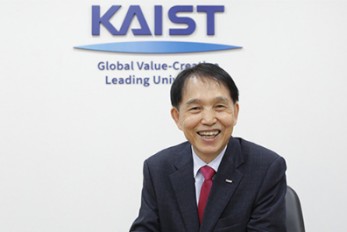
Provost Kwang Hyung Lee Elected as the 17th President of KAI..
< Provost Kwang Hyung Lee was selected as the 17th president of KAIST on February 18. > Provost and Executive Vice President Kwang Hyung Lee was selected as the 17th president of KAIST during a vote of the KAIST Board of Trustees on February 18. He will succeed President Sung-Chul Shin, whose four-year term concludes on February 22. President-elect Lee, 67, was among the three final candidates who were nominated by the Presidential Search Committee. Upon the selection, President-elect Lee said he will take up new challenges to transform KAIST into the most relevant research university in the world, fostering talents who can work with emerging technologies while pushing for innovative R&D initiatives that will benefit all of humanity. President-elect Lee is a futurologist who pioneered multidisciplinary studies and research at KAIST. He advocated that the convergence of information, biology, and nano-technologies would be critical for future industries, playing a crucial role in establishing the Department of Bio and Brain Engineering in 2001 and the Moon Soul Graduate School of Future Strategy in 2013. He then served as the inaugural head of both faculties. President-elect Lee has extensive administrative experience at KAIST, serving as Associate Vice President of the International Office, and Associate Vice President of Academic Affairs since early 2001. He is also serving as a member of the Korea Presidential Education Committee. An ardent champion of entrepreneurship and startups, he has advised the first generations of KAIST startup entrepreneurs such as Nexon, Idis, Neowiz, and Olaworks. President-elect Lee, drawn to creative thinking and flipped learning, is famous for watching TV upside down. Such pioneering ideas and his unusual thinking style were modeled in the ‘eccentric professor’ role featured on the TV hit drama of ‘KAIST’ from 1999 to 2000. An alumnus who earned his MS in industrial engineering at KAIST in 1980 after completing his undergraduate studies at Seoul National University, President-elect Lee joined the KAIST faculty in 1985 upon receiving his PhD in computer science from INSA de Lyon in France. A computer scientist as well as fuzzy theorist whose research area extends to AI, bioinformatics, fuzzy intelligent systems, and foresight methods, President-elect Lee has published more than 70 papers in international journals and textbooks on system programming, fuzzy set theory and its applications, and three-dimensional creativity. He also invented a fuzzy elevator, subway operation controller, and AI transportation controller. A fellow at the Korea Academy of Science and Technology and the National Academy of Engineering of Korea, he was decorated by the Korean government and the French government in recognition of the innovative education and research initiatives he has pursued.
-
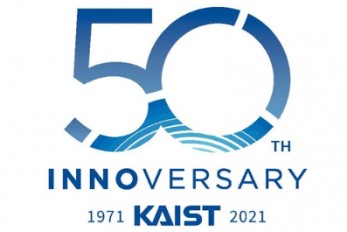
Ushering in a New Era at the 50th Innoversary Ceremony
President Moon Jae-In declares KAIST the future of Korea < The official ceremony to celebrate the 50th anniversary was held on February 16. > KAIST reaffirmed its goal of becoming an institute that can serve the world for the next century, marking its 50th anniversary on February 16. The KAIST community and distinguished guests gathered online during the official ceremony to commemorate KAIST’s anniversary and envisioned ways to serve the world, a major shift from its founding mission focusing on national growth. The ceremony celebrated the legacy of KAIST, which has become a trailblazer by fostering the most competent scientists and engineers and making breakthroughs which led to the nation becoming a global high-tech leader. President Moon Jae-In applauded KAIST as “the future of Korea” in his online congratulatory message, saying that “KAIST has made us feel proud when the nation stays ahead in science and technology. The dream of KAIST has been the dream of Korea. The passion of KAIST has been the passion of Korea. KAIST is the future of Korea.” “KAIST has overcome challenges and created innovations for advancing the nation, from the first internet network to launching our first satellite in the early 80s to the Mobile Clinic Module (MCM), a negative pressure ward module in response to COVID-19. Whenever the nation faced a challenge, KAIST was there.” President Moon also asked KAIST researchers to find sustainable ways to balance nature and humanity in this time of climate change and the Fourth Industrial Revolution. Executive Chairman of the World Economic Forum Dr.Klaus Schwab also congratulated, saying "KAIST is a leader in ensuring social inclusion. Founded with the support of USAID, today it is paying it forward and sharing the same support through the Kenya-KAIST project." < President Moon Jae-In said that the dream of KAIST has been the dream of Korea. KAIST is the future of Korea in his congratulatory message during the ceremony. > The ceremony first brought Dr. KunMo Chung to the stage, the man who proposed the idea of founding the first advanced science and technology institute in Korea. His proposal to the then administrator of USAID John Hannah resulted in the Korean government meriting a 6 million USD loan for to start KAIST. He was the only Korean member of the USAID feasibility study team led by Dr. Frederick Terman, the former vice president of Stanford University. Dr. Chung wrote the Terman Report, which gave a green light to the establishment of KAIST in Korea in 1970. Dr. Chung said the nation’s strong desire to escape from poverty through the advancement of science and technology was thoroughly realized by KAIST. “The Terman Report’s vision was perfectly realized. Now it’s time to envision the next dream of KAIST for another century.” President Sung-Chul Shin said in his anniversary speech that KAIST has now transformed into a university that will serve the all of humanity by advancing science and technology while fostering new talents best fit for the new global environment. President Shin said that to fulfill KAIST’s second dream, the university will drive innovation in the five major areas of education, research, technology commercialization, globalization, and future strategy, under the C3 spirit of a Challenging spirit, Creativity, and Caring minds. “In the next 50 years, KAIST hopes to fulfill the 10-10-10 Dream, that is, to have 10 Singularity Professors who have produced world-class achievements, 10 Decacorn startups valued at 10 trillion won, and global campuses in 10 countries.” < Four young KAIST professors who are conducting research in the flagship fields of mobility, new materials, post-AI, and bio-medicine presented their research vision. > Then, four young KAIST professors who are conducting research in the flagship fields of mobility, new materials, post-AI, and bio-medicine presented their research vision and gave speeches. Professor Hae-Won Park from the Department of Mechanical Engineering and Professor Jihyeon Yeom from the Department of Materials Science and Engineering said the advent of new mobility combined with robotics and new nano-materials scaled down into spintronics, ‘KAISTronic materials’, will provide new momentum for the industry and the wellbeing of humanity. Professor Kijung Shin from the Graduate School of AI spoke on the new future transformed by quantum computers. Professor Young Seok Ju from the Graduate School of Medical Science and Engineering predicted a future in which cancer will no longer be a terminal disease and digital cells and the digitization of bio-medicine will significantly improve our quality of life. He said the combination of anti-aging and reverse aging studies will make a difference in our lives. After the official ceremony, KAIST’s administrative leadership including President Shin and Dr. Chung attended a ceremony to dedicate the sky lounge at the Academic Cultural Complex as the John Hannah Hall. Terman Hall, located in the Creative Learning Building, was dedicated in 2004 in honor of Dr. Frederick Terman. < President Shin and Dr.Chung pose at the John Hannah Hall. >
-

COVID-Update: Spring 2021 Classes Continue Online
< The spring 2021 classes will also be online as the pandemic continues into the new year. > KAIST announced that its spring 2021 classes will also be online as the pandemic continues into the new year. The spring semester will begin on March 1. Executive Vice President and Provost Kwang Hyung Lee said in a letter to the KAIST community on January 15 that nearly all classes in the 2021 spring semester will be held online. However, a very limited number of lab classes and other classes that require on-site practice and demonstrations will be offered either in-person or in a blended format. In addition, graduate courses above the 600 level and graduate courses in the College of Business at the Seoul campus will be allowed to conduct in-person or blended classes under very strict social distancing guidelines. Provost Lee said that the university will be revert back to in-person classes as soon as the government eases the social distancing guidelines. As of February 4, the nation is under Level 2.5 in Seoul and its metropolitan areas, while other regions are at Level 2. Level 2.5 prohibits the gathering of 10 or more people, and Levels 1 and 2 require gatherings to be fewer than 50 people. At Level 3, all classes will be held online. Test management is another challenge. Regarding mid-term and final exams, the university plans to give more flexibility to professors. Professors may give additional assignments instead of a mid-term exam. Open-book exams and real-time exams through Zoom will be another option. However, some classes that require in-person tests in some graduate courses will be allowed as long as they follow very strict social distancing guidelines.
-
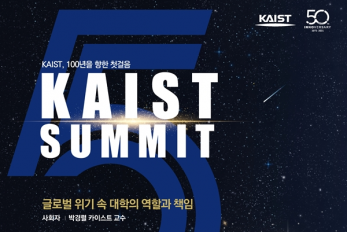
Top University Leaders Urge Innovation for the Post-COVID Er..
- Presidents of KAIST, MIT, Tokyo Tech, and Northwestern to define new roles and responsibilities of universities for the post-COVID and 4IR eras during an online summit in celebration of KAIST’s 50th anniversary. - Universities are facing ever-mounting pressure to address impacts brought on by COVID-19 and the emerging technologies of the Fourth Industrial Revolution (4IR). Presidents from MIT, Tokyo Tech, and Northwestern University will join the KAIST Summit to explore new directions for higher education during the post-COVID era intertwined with the 4IR. They agree that addressing these dual challenges requires pushing for innovations to rebuild the competitive edges of universities. This summit is one of KAIST’s series of events to envision the future of KAIST and higher education in celebration of its 50th anniversary. The online summit will be live streamed on KAIST’s official YouTube channel (https://www.youtube.com/c/KAISTofficial) on February 3, 2021, from 10 a.m. to 12:00 p.m. Korean time (February 2, 7:00-9:00 p.m. CST and 8:00-10:00 p.m. EST, respectively). The KAIST Summit titled “The Roles and Responsibilities of Universities in a Global Crisis” will discuss a range of issues affecting many aspects of universities in the coming decades. “This summit will allow us to measure the level of risk that universities face today and will face in the future. Although there will be varying views on what a post-COVID world might look like, one thing for sure is that universities cannot go back to the way they used to exist and operate. Moreover, the 4IR continues to infiltrate and shake up our daily lives. Changes are inevitable, and universities must pursue bold and innovative responses to remain sustainable and relevant to society,” said KAIST President Sung-Chul Shin on the background of hosting the event. The keynote speakers include KAIST President Shin, MIT President L. Rafael Reif, Tokyo Tech President Kazuya Masu, and Northwestern University President Morton Schapiro. After the keynote speech session, the speakers will take part in a panel discussion on three topics: “The Digital Divide,” “Emerging Challenges in AI,” and “Social Entrepreneurship and University-Industry Collaboration.” A Q&A session with an online audience consisting of KAIST faculty, staff, and students as well as high school students across the nation will follow shortly afterwards. President Reif of MIT will congratulate KAIST on its successful 50-year journey from meager beginnings to achieving its current status as one of the finest global universities in science and technology. Then he will give a talk titled “Universities as Engines of Change” to present how universities have played a critical role in advancing solutions to humanity’s most urgent problems. President Masu of Tokyo Tech will stress the importance of universities’ continuous dialogue with society as drivers of innovation. In his speech titled “Designing Our Future—Tokyo Tech DLab’s Approach,” he will introduce the activities of Tokyo Tech’s Laboratory for Design of Social Innovation in Global Networks (DLab) and explain how DLab collaborates for the future with members of society. President Schapiro of Northwestern University will speak about how universities might incorporate the lessons they learned in dealing with COVID-19 to improve their research, teaching, and public service in the post-pandemic era. He will also look into issues arising from changing labor market needs associated with the 4IR and the aftermath of COVID-19 in his talk titled “The University in the ‘New Normal.’” Finally, President Shin of KAIST will deliver a presentation on the “Visions & Innovations for the Next Dream of KAIST.” He will reflect on the remarkable track record from KAIST’s first 50 years and how it has contributed significantly to the rapid growth of Korea as a hi-tech powerhouse. Furthermore, he will elaborate on a new vision for the development of KAIST over the next 50 years and roll out a set of strategic innovation plans in the five areas of education, research, technology commercialization, globalization, and future strategy. In the panel discussion, the four presidents will dive into a more intense conversation on such topics as universities’ role in bridging the increasing digital divide through their research, education, and international cooperation; the socioeconomic implications and ethical challenges of the fast deployment of AI and robotics; 4IR disruptions that will transform higher education; ways to foster social innovation and youth entrepreneurship; and how to build university-industry cooperation. More information on KAIST’s 50th anniversary celebrations can be found on its special celebratory website at https://50.kaist.ac.kr/eng/. The official anniversary ceremony is scheduled for February 16, 2021, from 10 a.m. Korean time, and live-streaming will also be made available on KAIST’s official YouTube channel at https://www.youtube.com/c/KAISTofficial. (END)
-

KAIST and Google Partner to Develop AI Curriculum
Two KAIST professors, Hyun Wook Ka from the School of Transdisciplinary Studies and Young Jae Jang from the Department of Industrial and Systems Engineering, were recipients of Google Education Grants that will support the development of new AI courses integrating the latest industrial technology. This collaboration is part of the KAIST-Google Partnership, which was established in July 2019 with the goal of nurturing AI talent at KAIST. The two proposals -- Professor Ka’s ‘Cloud AI-Empowered Multimodal Data Analysis for Human Affect Detection and Recognition’ and Professor Jang’s ‘Learning Smart Factory with AI’-- were selected by the KAIST Graduate School of AI through a school-wide competition held in July. The proposals then went through a final review by Google and were accepted. The two professors will receive $7,500 each for developing AI courses using Google technology for one year. Professor Ka’s curriculum aims to provide a rich learning experience for students by providing basic knowledge on data science and AI and helping them obtain better problem solving and application skills using practical and interdisciplinary data science and AI technology. Professor Jang’s curriculum is designed to solve real-world manufacturing problems using AI and it will be field-oriented. Professor Jang has been managing three industry-academic collaboration centers in manufacturing and smart factories within KAIST and plans to develop his courses to go beyond theory and be centered on case studies for solving real-world manufacturing problems using AI. Professor Jang said, “Data is at the core of smart factories and AI education, but there is often not enough of it for the education to be effective. The KAIST Advanced Manufacturing Laboratory has a testbed for directly acquiring data generated from real semiconductor automation equipment, analyzing it, and applying algorithms, which enables truly effective smart factory and AI education.” KAIST signed a partnership with Google in July 2019 to foster global AI talent and is operating various programs to train AI experts and support excellent AI research for two years. The Google AI Focused Research Award supports world-class faculty performing cutting-edge research and was previously awarded to professors Sung Ju Hwang from the Graduate School of AI and Steven Whang from the School of Electrical Engineering along with Google Cloud Platform (GCP) credits. These two professors have been collaborating with Google teams since October 2018 and recently extended their projects to continue through 2021. In addition, a Google Ph.D. Fellowship was awarded to Taesik Gong from the School of Computing in October this year, and three Student Travel Grants were awarded to Sejun Park from the School of Electrical Engineering, Chulhyung Lee from the Department of Mathematical Sciences, and Sangyun Lee from the School of Computing earlier in March. Five students were also recommended for the Google Internship program in March. (END)
-
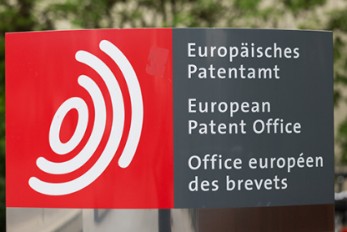
EPO: KAIST the 7th Leading Innovation Cluster Globally
A study published by the European Patent Office (EPO) shows that Korea is the second leading hub for technologies related to the Fourth Industrial Revolution. According to the study, Korea has the second highest innovation intensity for the Fourth Industrial Revolution worldwide with 526 international patent families (IPFs) per million inhabitants, after Finland (654) and well ahead of Japan (405) and the US (258). Korea specializes in IT hardware, power supply, smart goods and services. The study also reported that the contribution of universities and public research organizations in Korea is very high, standing at 12% compared to the world average of 5.6%. Among others, ETRI (Electronics and Telecommunications Research Institute) topped the universities and public research organizations globally with filings of over 1,500 IPFs between 2010 and 2018. KAIST ranks the 7th with filings of 185, ahead of MIT (179). The EPO released its study titled 'Patents and the Fourth Industrial Revolution: the Global Technology Trends Enabling the Data-Driven Economy' on December 10. It analyzed all IPFs related to the Fourth Industrial Revolution worldwide between 2000 and 2018. The study found that nearly 40,000 new IPFs were filed for these technologies in 2018 alone. This means they accounted for more than 10% of all patenting activity worldwide that year. The analysis also showed that Seoul was the world’s most important cluster for Fourth Industrial Revolution patenting activity, accounting for almost 10% of all patents in this field worldwide, growing by 22.7% on average per year between 2010 and 2018, the third highest growth rate of the top 20 clusters. The cluster represented 86% of all Fourth Industrial Revolution patenting activities in Korea. Samsung and LG had a combined share of two-thirds of the cluster’s patent filings, while another 15% was contributed by ETRI. In the industry sector, Samsung was the clear global leader with over 12,000 IPFs, which corresponds to 4.6% of all Fourth Industrial Revolution inventions between 2000 and 2018. Samsung is followed, albeit by a wide gap of almost 6,000 IPFs filed, by Sony (6,401), and the second Korean company, LG, in third place (6,290). The patent analysis in this report is based on IPFs. Each IPF represents a unique invention and includes patent applications filed and published in at least two countries or filed with and published by a regional patent office, as well as published international patent applications. The EPO, headquartered in Munich, Germany, is one of the largest patent offices in the world and the leading authority on patent information and searching. (END)
-
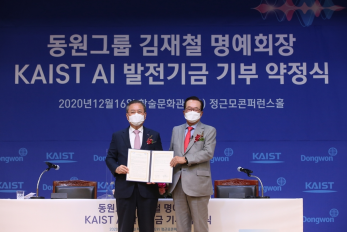
Dongwon Chairman Donates ₩50 Billion to Fund AI Graduate Sch..
< Dongwon Group Honorary Chairman and Founder Jae-chul Kim > Dongwon Group Honorary Chairman and Founder Jae-chul Kim donated his private property worth ₩50 billion (US $46 million) to KAIST on December 16. Honorary Chairman Kim’s gift will fund the KAIST Graduate School of AI (GSAI), which was established last year. The KAIST GSAI will be re-named the ‘Kim Jae-chul Graduate School of AI’ to honor Honorary Chairman Kim. This is the third major donation that KAIST has received this year following KAIST Development Foundation Chairman Soo-Young Lee’s ₩67.6 billion in real estate in July and another ₩10 billion from a KAIST alumnus, Chairman Byeong-Gyu Chang of Krafton, in January. “KAIST, as the cradle that trains Korea’s best talents in science and technology, has been at the forefront of leading national development over the past 50 years. I hope that KAIST will also strive to nurture global talents who excel in AI innovation and steer Korea’s new advancements to lead the Fourth Industrial Revolution,” said Honorary Chairman Kim during the donation ceremony at KAIST’s main campus in Daejeon. The ceremony was held in strict compliance with Level Two social distancing guidelines and measures in response to the persistent coronavirus. Less than 50 people, including Honorary Chairman Kim’s family, President Sung-Chul Shin, and professors from key posts at KAIST, attended the ceremony. Dongwon Group is one of the leading fishery companies in Korea, established in 1969 by Honorary Chairman Kim. He recalled memories of his childhood as he explained the background of the donation, saying, “When I was young, I searched for Korea’s future in the world’s oceans. However, a new future lies in the ‘oceans of data.’” “I have been pondering how I could further contribute to my country, and realized that bringing up talented individuals in the AI and data science-related fields is important. I hope that my donation today will aid the take-off of KAIST’s great voyage towards becoming a global “flagship” in the new eras to come,” Honorary Chairman Kim added. To this, President Shin responded acclaiming the noblesse oblige held by Honorary Chairman Kim to further develop Korea’s science and technology and make Korea into a leader in AI innovation. “We will always keep KAIST’s role and mission close to our hearts and do our best to make KAIST into a global hub for talent cultivation and R&D in AI, based on Honorary Chairman Kim’s donation,” said President Shin. With Honorary Chairman Kim’s donation, the KAIST GSAI will first expand its faculty in both quantity and quality. By expanding the number of full-time, highly qualified professors to 40 by 2030, the School will train the most talented personnel in fusion and convergence AI. The KAIST GSAI opened in August 2019 as the first school in Korea to be selected as part of the ‘2019 Graduate School for AI Support Project’ by the Ministry of Science and ICT. The current faculty is composed of 13 full-time professors including ex-researchers from AI labs of global conglomerates including Google, IBM Watson, and Microsoft, as well as eight adjunct professors, making a total of 21 faculty members. There are currently 138 students attending the School, including 79 master’s students, 17 in the integrated MS-PhD program, and 42 PhD candidates. < KAIST President Sung-Chul Shin (left) and Dongwon Group Honorary Chairman and Founder Jae-chul Kim (right) at the Donation Ceremony. > (END)
-
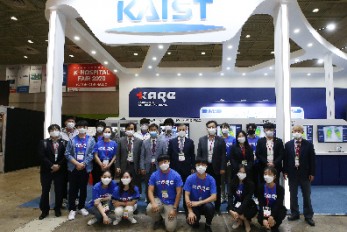
KAIST Showcases Healthcare Technologies at K-Hospital Fair 2..
KAIST Pavilion showcased its innovative medical and healthcare technologies and their advanced applications at the K-Hospital Fair 2020. Five KAIST research groups who teamed up for the Post-COVID-19 New Deal R&D Initiative Project participated in the fair held in Seoul last week. The K-Hospital Fair is a yearly event organized by the Korean Hospital Association to present the latest research and practical innovations to help the medical industry better serve the patients. This year, 120 healthcare organizations participated in the fair and operated 320 booths. At the fair, a research group led by Professor Il-Doo Kim from the Department of Materials Science and Engineering demonstrated the manufacturing process of orthogonal nanofibers used to develop their ‘recyclable nano-fiber filtered face mask’ introduced in March of this year. This mask has garnered immense international attention for maintaining its sturdy frame and filtering function even after being washed more than 20 times. Professor Kim is now extending his facilities for the mass production of this mask at his start-up company. While awaiting final approval from the Ministry of Food and Drug Safety to bring his product into the market, Professor Kim is developing other mask variations such as eco-friendly biodegradable masks and transparent masks to aid the hearing-impaired who rely on lip reading to communicate. < Manufacturing process of orthogonal nanofibers > The team working under Professor Wonho Choe from the Department of Nuclear and Quantum Engineering presented two low-temperature plasma sterilizers for medical use, co-developed with Plasmapp, a start-up company founded by a KAIST alumnus. Their sterilizers are the first ones that can sterilize medical devices by diffusing hydrogen peroxide vapor into the pouch. They rapidly sterilize medical instruments and materials in just seven minutes without leaving toxic residue, while reducing sterilization time and costs by 90%. < Low-temperature plasma sterilizers for medical use > Professor Hyung-Soon Park and his researchers from the Department of Mechanical Engineering introduced a smart protective suit ventilation system that features high cooling capacity and a slimmed-down design. For comfortable use, the suit is equipped with a technique that monitors its inner temperature and humidity and automatically controls its inner circulation accordingly. The group also presented a new system that helps a person in a contaminated suit undress without coming into contact with the contaminated outer part of the suit. < Smart protective suit ventilation system > Professor Jong Chul Ye's group from the Department of Bio and Brain Engineering demonstrated AI software that can quickly diagnose an infectious disease based on chest X-ray imaging. The technique compares the differences in the severity of pneumonia in individual patients to distinguish whether their conditions fall under viral pneumonia including COVID-19, bacterial pneumonia, tuberculosis, other diseases, or normal conditions. The AI software visualizes the basis of its reasoning for each of the suspected diseases and provides them as information that can be utilized by medical personnel. < Infectious disease diagnostic AI software based on chest X-ray imaging > Finally, researchers of Professor Ki-Hun Jeong’s team from the Department of Bio and Brain Engineering demonstrated their ultra-high-speed sub-miniature molecular diagnostic system for the on-site diagnosis of diseases. The existing Polymerase Chain Reaction (PCR) diagnostic usually takes from 30 minutes to an hour to provide results, but their new technique using an LED light source can present results within just three minutes and it is expected to be used actively for on-site diagnosis. < Ultra-high-speed sub-miniature molecular diagnostic system using LED light source > Professor Choongsik Bae, the Director of the Post-COVID-19 New Deal R&D Initiative Project, said, “KAIST will build a healthy relationship amongst researchers, enterprises, and hospitals to contribute to the end of COVID-19 and build a new paradigm of Korean disease prevention and control.” KAIST launched the Post-COVID-19 New Deal R&D Initiative in July with the support of the Ministry of Science and ICT of Korea. This unit was created to overcome the pandemic crisis by using science and technology, and to contribute to economic development by creating a new antiviral drug industry. The unit is comprised of 464 KAIST members including professors, researchers, and students as well as 503 professionals from enterprises, hospitals, and research centers. (END)

